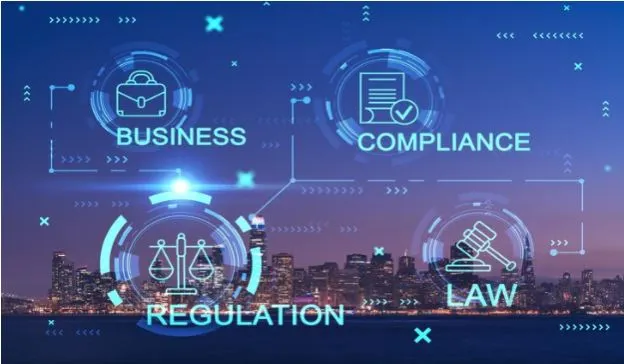A comprehensive and intricate set of regulations applies to startups that provide financial services, including company credit cards, bank accounts, and loan access. These regulations safeguard the interests of the startup, its clients, and the US financial system.
Every aspect of a financial product is impacted by compliance, including marketing, onboarding, and account closures. For instance, in your marketing materials, you must be explicit and upfront about all terms of a financial product (such as fees, interest, payment requirements, and other data).
In addition to adhering to all fair lending rules, if you are granting credit, you must appropriately do Know Your Customer (KYC) checks and sanctions screenings when onboarding users. Additionally, you might have to abide by certain debt collection regulations that control how often and when you can send out collections reminders to individuals behind on their credit account payments. And that addresses a small portion of the compliance rules you must abide by.
What Does the Data Speak?
The regulatory landscape is changing, and the FinTech industry needs help to keep up. Recent data shows, that 93% of FinTechs need help to meet compliance requirements.
It does not look surprising since 60% of FinTech companies needed to pay at least $250 in compliance penalties last year. The penalties include failure to report suspicious activities, lack of customer due diligence and not monitoring transactions.
Some Compliance Regulations in the US
FinTech software development companies in the US must comply with financial regulations depending on the activity they are engaged in. Nonetheless, there are a few typical limitations companies should be aware of.
1. Fair Credit Reporting Act (FCRA)
The FCRA expands consumer rights for credit report access and establishes guidelines for how financial organizations may gather credit information about their customers.
2. Gramm-Leach Bliley Act (GLBA)
The Financial Modernization Act’s GLBA mandates that all financial institutions notify their clients about data sharing and make sure their data is properly protected.
3. JOBS Act
Platforms for crowdfunding and other forms of financing must register with FINRA and the SEC under the JOBS Act. These companies are subject to new duties and restrictions under the JOBS Act, including mandatory disclosures and limit increases.
4. US Anti-Money Laundering Regulations (AML)
The USA Patriot Act and the Bank Secrecy Act were the two primary anti-money laundering laws that US bank and financial institution regulators created and are still in effect today.
Customer due diligence, anti-money laundering risk management techniques, and other record-keeping obligations are also mandated by these regulations. The Patriot Act addresses international business dealings in some of its provisions.
5. Securities Act and Exchange Act
The use of Initial Coin Offerings (ICOs) by FinTech companies has grown. Although there has been debate over how these actions should be handled in the US, the Howey Test has already established a precedent. If the ICO passes this test and satisfies the threshold requirements, it will be governed by the Securities Act and Exchange Act, which establishes the legal standing of the project.
Challenges Faced in FinTech Regulations
The regulatory environment surrounding FinTech is constantly changing because different regulators have different opinions about creating a framework that complies and pushes innovation.
1. Uncertainty in Regulation
Regulatory uncertainty is a source of concern for FinTech executives and investors since it can hamper investment and innovation in the sector. Uncertainty brought by conflicting regulations makes it challenging for organizations to implement long-term plans. Fostering an environment that is favorable to the growth of FinTech requires regulation to be clear and consistent.
2. Complexity in Compliance
FinTech companies are struggling to keep pace with the complexities of regulatory compliance. The process of obtaining a license steering through an evolving regulatory environment provides barriers that require legal expertise and adjustments. It can be overwhelming to steer through various agencies and complex compliance regulations, specifically for smaller businesses with limited funding.
3. Burdensome Reporting Obligations
FinTech professionals point out the heavy reporting requirements imposed by regulatory bodies. Enormous amounts of paperwork and documentation required for compliance consume valuable time and resources, driving attention from the main task of the company.
Opportunities in FinTech Regulations
FinTech businesses that already have to handle their regulatory requirements are in an excellent position to develop products that will satisfy these standards from the outset, guaranteeing that end users will be protected from the moment of installation.
1. Acknowledge Regulating
FinTech leaders support improved cooperation between regulators and industry participants. Collaboration and open communication can result in more effective regulations that strike a balance between financial stability, consumer protection, and innovation. FinTech startups, banks, and regulators may collaborate to create an atmosphere that supports ethical and prosperous FinTech innovation.
2. Technological Solutions
Executives from central banks and other financial regulators emphasize how technology may improve the effectiveness of regulations. Blockchain technology, artificial intelligence, and advanced analytics present chances to enhance data management and automate compliance procedures. Adopting technological solutions can expedite regulatory monitoring and enable a more comprehensive risk management strategy.
3. Innovative Regulation
FinTech professionals highlight the necessity of innovative regulations to keep up with the rapid progress of technology. Adopting adaptable and flexible regulatory frameworks that promote experimentation can foster innovation while mitigating potential hazards. Pilot projects and regulatory sandboxes are excellent platforms for testing out new finance products.
Ingenious Solutions to Comply with Regulations
FinTech regulations necessitate comprehensive compliance systems, which can be difficult for startups with little institutional experience or funding. Novel approaches are being developed to deal with these problems.
1. Sandbox Regulations
Regulatory sandbox deployment is one well-known strategy. Under the regulators, FinTech companies can test new products and services in these controlled environments without having to immediately shoulder the entire compliance load.
The strategy fosters innovation while guaranteeing that regulatory supervision can change to accommodate emerging technologies and commercial structures. Many have successfully adopted regulatory sandboxes to strike a balance between the requirements of compliance and innovation.
2. AI and ML
Advanced technologies like machine learning (ML) and artificial intelligence (AI) can also improve compliance efforts. These technologies can assist in automating difficult compliance procedures, improving the efficiency of fraud detection, and ensuring that FinTech companies continue to comply with changing regulatory requirements.
3. Third-party Risk Management
Traditional banks and FinTech companies often collaborate, so both parties need to have strong and efficient risk management systems. Nevertheless, 66 percent of banks and financial services firms have undeveloped or inexperienced third-party risk management strategies, according to a recent poll conducted by Crowe Horwath LLP and Compliance Week. There is a need for improvement as just a small number of respondents reported having developed frameworks.
Conclusion
The regulatory environment surrounding Fintech is always changing because different regulators have different ideas about how to create a framework that both complies with their mandates and encourages useful innovation. The particular combination of regulatory requirements and accountability a Fintech company must respond to will vary based on the program’s structure, the kinds of goods and services it provides, and the regions in which it conducts business.
Also Read: 5 Ways Of Leading Modern Trading And Shaping Future Of Investment









